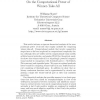Free Online Productivity Tools
i2Speak
i2Symbol
i2OCR
iTex2Img
iWeb2Print
iWeb2Shot
i2Type
iPdf2Split
iPdf2Merge
i2Bopomofo
i2Arabic
i2Style
i2Image
i2PDF
iLatex2Rtf
Sci2ools
127
click to vote
ECCC
2000
2000
On the Computational Power of Winner-Take-All
This article initiates a rigorous theoretical analysis of the computational power of circuits that employ modules for computing winner-take-all. Computational models that involve competitive stages have so far been neglected in computational complexity theory, although they are widely used in computational brain models, artificial neural networks, and analog VLSI. Our theoretical analysis shows that winner-take-all is a surprisingly powerful computational module in comparison with threshold gates (= McCullochPitts neurons) and sigmoidal gates. We prove an optimal quadratic lower bound for computing winner-take-all in any feedforward circuit consisting of threshold gates. In addition we show that arbitrary continuous functions can be approximated by circuits employing a single soft winner-take-all gate as their only nonlinear operation. Our theoretical analysis also provides answers to two basic questions that have been raised by neurophysiologists in view of the well-known asymmetry b...
Related Content
| Added | 18 Dec 2010 |
| Updated | 18 Dec 2010 |
| Type | Journal |
| Year | 2000 |
| Where | ECCC |
| Authors | Wolfgang Maass |
Comments (0)

